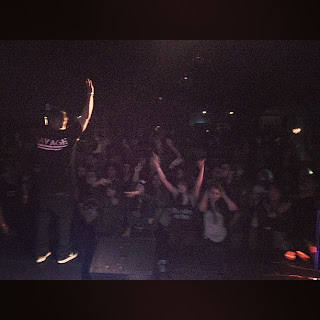 |
| Bambu rocking a sold-out The Echo in Los Angeles on Friday. The crowd was probably predominantly Chicano/Latino and Filipino. (Photo by Joseph Alvaro) |
 |
| Filipino/Mexicano emcee Odessa Kane representing "Cuetes and Balisangs" for Southeast San Diego. (Photo by Joseph Alvaro) |
In the United States, Filipino American hip hop artists have had better results in finding a captive public in hip hop compared to their counterparts in the Philippines. Many (not all) Filipino American hip hop artists, especially on the West Coast, know very well that many Filipino Americans will support them at shows, patronize their music, and buy their merchandise.
But, what happens when Filipino American artists' audience move beyond a predominantly Filipino American audience? On Friday night, a whole posse of Filipino American male emcees (Double Dosage, Kixxie Siete, Odessa Kane, and Bambu) rocked a sold-out crowd at The Echo in Los Angeles. Sure, there was the usual Filipino American fans, but I would be confident in saying that the house was loaded with young Chicanos and Latinos who may have outnumbered the Pinoys. And just like the Pinoys, these folks were mouthing the lyrics of the performers on stage and pumping their fists just as high.
Kixxie's Hawthorne/South Bay fanbase, Odessa Kane's Filipino/Mexicano-centered lyrics, and Bambu's Soul Assassins affiliation (the crew of Cypress Hill) can certainly attribute to the very distinctly Los Angeles hip hop demographic. At one point, Bambu yelled out: "We were all colonized by the same people anyway!"
 |
| Bambu performs for the last time with the new daddy-o DJ Phatrick. (Photo by DJ Phatrick) |
And, for some reason (even though I am not surprised), I am curious as to the meanings of non-Filipinos who are drawn towards/indulge in/recite/embrace Filipino American-accentuated music and culture. What happens when Filipinos have a non-Filipino audience? Are they attuned to the Filipino-related lyrics? Do they identify with Filipinos? Do they hang out with Filipinos? If not, how are Filipinos relevant in their lives? Where do Filipinos appear in their imagination within a field of racial and ethnic power? How are Filipinos made legible to the non-Filipino cultural imagination aside from this music?
For the Asian Americans (non-Filipino) in the crowd: How do Asian Americans identify with Filipino Americans? If Filipino American hip hop artists have become (or have always been) dominant in music relative to other Asian American groups, what kind of identity-labor is done to align with Filipino issues? If Filipinos are marginalized culturally, politically, and academically (except for recent anti-imperial scholarship) when it comes to the pan-Asian American umbrella, what kind of value do Filipino American hip hop artists retain as cultural/racial "border crossers" who magnetize non-Filipino Asian Americans? Could/should/can Filipinos be embraced for their cultural value, and still be marginalized in other realms of Asian American power?
Or maybe that's it: Filipino American artists have a certain draw (power) because they are so flexible. They can somehow touch the souls of people of many backgrounds.
And that seems to be the ongoing trope: Filipinos somehow appear nowhere and yet appear for everyone at once. A Filipino is invisible in the larger schema of our cultural imagination, yet she/he is also right there all along.
Like famous Manila tour guide/activist/performer Carlos Celdran says: "Filipinos have little unique about them. And that's precisely what makes them so unique!"
Being unique yet broadly resonant seems to be a formula working for the fast-growing scene of Filipino American artists in hip hop.
---









